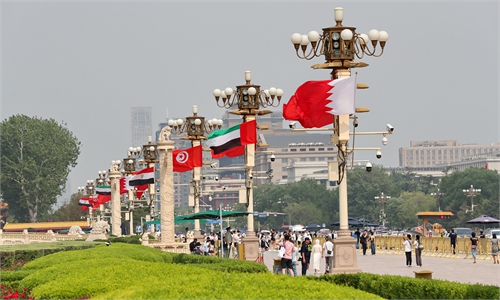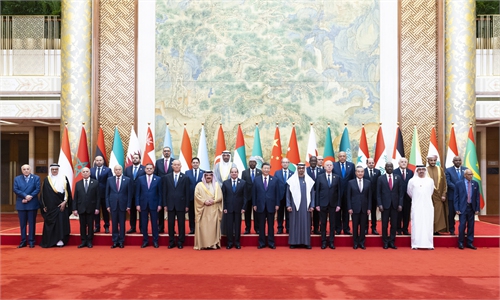
Illustration: Chen Xia/GT
Most people will be very interested to know the commercial ramifications of future cooperation between China and Arab League countries. The first focus is on how to give vitality to innovation in various sectors like life sciences, AI, green technology and so on that would be beneficial to the next generation and future generations of China and Arab League countries.
The second area of enhanced cooperation is actually very important tools to be provided for joint development, enjoying progress. That is the accelerated and expanded collaboration in finance.
This includes many things. One of those is the use of local currency for settlement of trade, which increases efficiency in addition to generally lowering the cost of transactions.
I think it is significant to note that the issuance of panda bonds is included in the offer recently made to Arab countries.
Panda bonds are yuan-denominated debts sold by financial institutions in China, allowing them to tap into the domestic yuan-denominated bond market.
This is very significant because six months ago, I spoke to a number of senior members or government members of Arab League countries about the fact that if they're facing budget deficit and they have to issue bonds, as they've been issuing them in US dollars, which is currently attracting six percent interest, at least - if not higher.
But if they issued yuan-denominated bonds, the interest rate could be as low as 2-point something percent. So, more than half is saved in terms of interest payment, if it is done in the yuan.
And given the fact that in order to address inflation, the US has been raising interest rates, despite talking about lowering rates.
So you end up with a situation in which the cost of borrowing in US dollars is significantly higher than borrowing in yuan. The US is used to living on credit. So people borrow, where the Chinese people have a culture of savings.
Hence you have a large pool of liquidity. For China, it's good because if its bonds are issued in the yuan, the recipient will receive China's currency and will end up using the yuan to buy services, equipment and machinery from the country. So it's actually beneficial for both sides.
China gets to export some of its goods and services. And the borrowing party from the Arab countries will end up with significant savings and low interest rate and also direct access to a very large pool of liquidity.
The third area of enhanced collaboration is the energy sector. Saudi Arabia is already beginning to move heavily into petrochemical processing in both China and Saudi Arabia. What's shipped out is not simply crude oil and is increasingly a mix of value-added refined products. We've seen a number of very large projects starting in China.
The other side that's significant in this is new and renewable sources of energy. The Middle East is home to wonderful and abundant sunshine. Sometimes a little too much. Certainly, solar and wind can be had at very low cost given the advances in technology and the scale of production which had been accumulated in China - the efficiency of scale is now reaching incredible levels that it will be very much cheaper than other conventional sources of energy.
And in this context on the commercial side, Chinese enterprises are encouraged to work with Arabic countries and enterprises in increasing new and renewable sources of energy. And that's significant because that would be very, very helpful for many of the smaller countries that don't have the capacity to really do it themselves.
China's experience, scale of production and also its productive efficiencies will make this very meaningful for Arab countries.
The last but not least is people-to-people exchanges and cultural exchanges. I remember doing a program a couple of days ago about how in the United Arab Emirates (UAE), over 70,000 children and teenagers in the country are learning Chinese in 171 schools. The same thing is now happening in Saudi Arabia where middle school students are required to take two Chinese courses per week. And this will enhance the possibility of better communication exchanges between those countries and China.
China is a very big country with the world's second-largest economy. There are many opportunities for Arab countries to collaborate with Chinese enterprises. I think this is good for both sides. This is good for all.
The author is a senior fellow at Taihe Institute. bizopinion@globaltimes.com.cn


